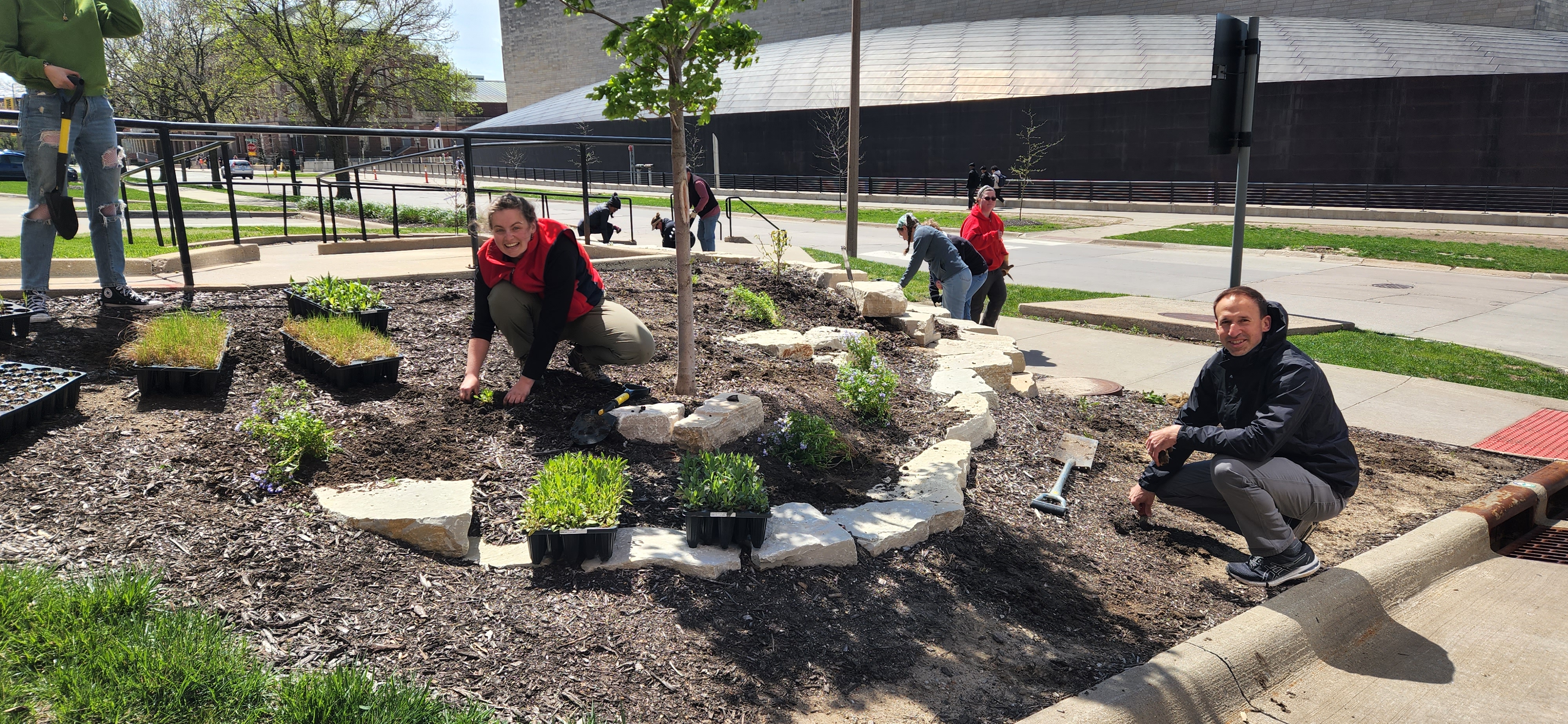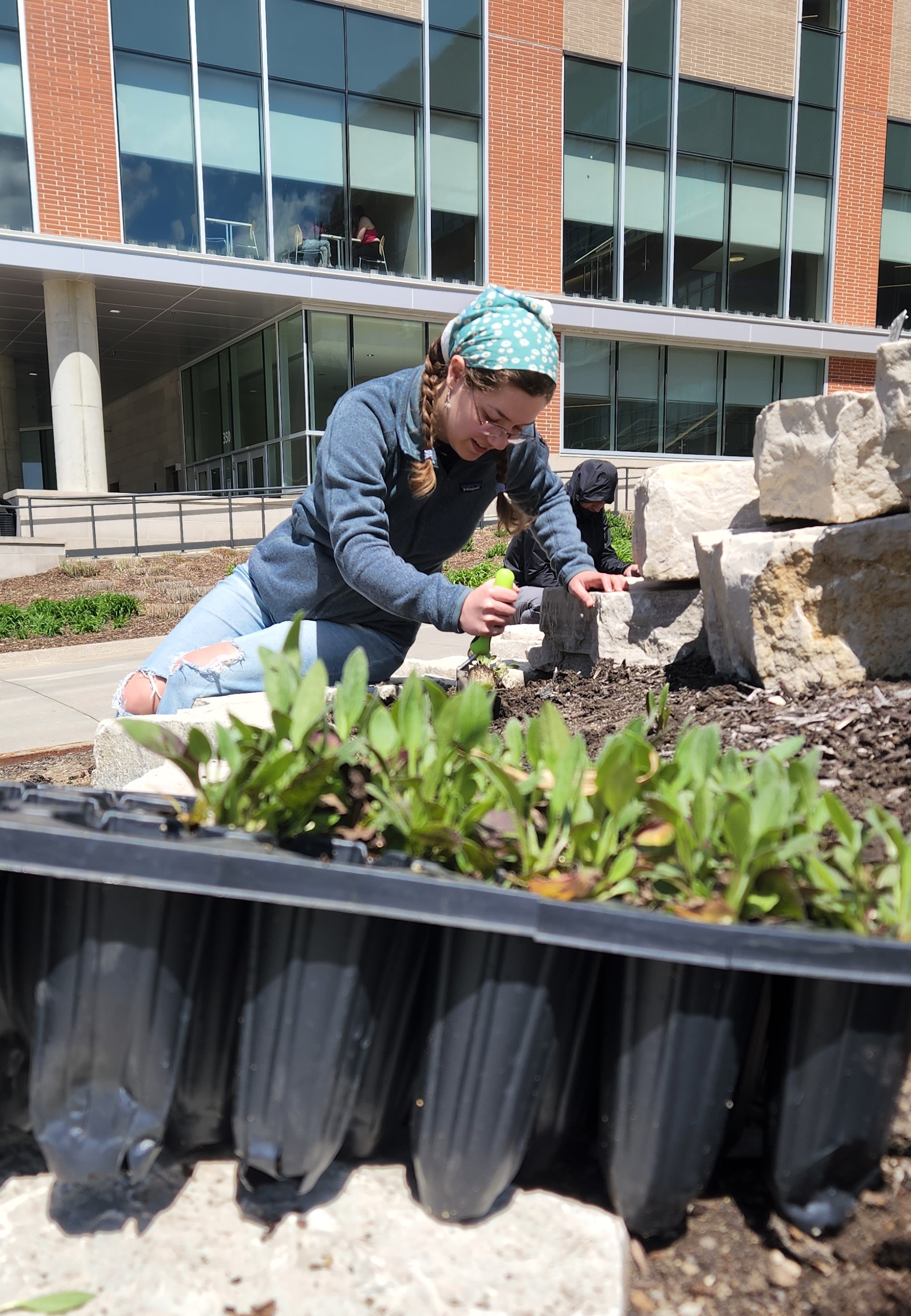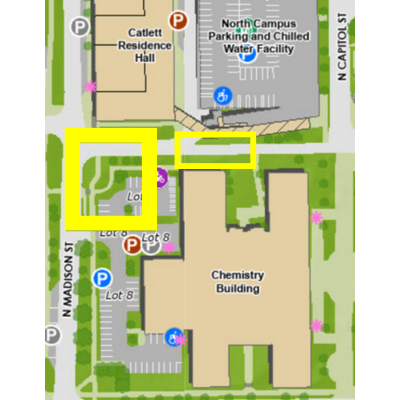College of Liberal Arts & Sciences
New Pollinator Gardens and Student Perspectives

By Delaney Behning
The University of Iowa is proud to add two new gardens to campus. The larger garden, near Catlett Hall, adds to the university's growing list of Bee Campus pollinator gardens! Being a member of the Bee Campus USA community means that the university is committed to the goals of conserving native pollinators through increasing the number of native plants in the area, providing nest sites for pollinators, and minimizing the use of pesticides on campus. Part of these community commitments includes service-learning projects, such as the planting of pollinator gardens and native plants. The second garden, near North Hall, includes some native pollinator plants, but also has space for more traditional produce-oriented gardening. The recent plantings involved students and other university members to further improve practices on campus and help to maintain the university’s valued Bee Campus USA status.
|
Bee campus sign at the Catlett garden |
Student planting native plants in the Catlett garden. |
Lucas Beilby, one of the co-presidents of the student gardening organization D.I.R.T., had a role in the recent plantings. To plant these gardens, D.I.R.T. collaborated with landscaping services to prepare the areas, select the plant species, assist in planting, and will continue to help maintain the spaces.
Lucas explained that campus gardens are important for increasing student interest in gardening and sustainability. Using native pollinator species in the space next to Catlett Residence Hall will expose students to native plants and gardening spaces, and hopefully inspire similar actions across campus and for students if they have gardens at home. The North Hall edible garden will help D.I.R.T. engage with the campus community and teach students, faculty, and staff about organic growing practices. The produce harvested from the area will be used for donation to the Food Pantry at Iowa. Students like Lucas hope these gardens flourish and allow for increased involvement in similar projects around campus. While these are a great addition, he noted, there is always an opportunity to improve and expand green spaces across campus.
Lucas mentioned that Bee Campus USA status is incredibly important for the university to maintain, not only because the maintenance and addition of pollinator spaces assists our local ecosystems by allowing pollinators to grow and thrive, but also because it makes the concept of pollinator spaces more accessible and educational for individuals in our community. Additionally, being a part of Bee Campus USA creates a goal for the university to strive toward, and this ensures some level of accountability aside from desires of people on campus. Ideas like Lucas’s demonstrate elements of sustainability in action: community involvement, long-term goals, educational aspects, and environmental benefits.
Another student, Kobie Long, works as the Bee Campus Intern for the University of Iowa’s Office of Sustainability and the Environment. She worked on coordination and communication between University Landscape Services and D.I.R.T. for the new gardens. These plantings included pollinator plants such as Sand coreopsis, Wild Columbine, Compass plant, horsetail milkweed, purple and orange coneflower, Prairie Ironweed, Plains Wild Indigo, and others.
|
Check out the pollinator gardens located on the map within the yellow square. |
Kobie also assisted with educational aspects of the plantings, such as providing information on the plants themselves and signage for garden visitors. These gardens are very important for pollinators such as bees but also butterflies, moths, flies, and beetles, that are crucial to our food systems and habitats in Iowa. Kobie explained that since the university owns and manages a lot of land, they have the responsibility and opportunity to manage the land in a way that promotes environmental and human well-being, and one way that this can be done with additions of new pollinator gardens.
Kobie is also hopeful about the future of these pollinator gardens. There is a lot of potential for the gardens to grow in size and number across campus. And when they are more established, they serve as better habitats for pollinators, and they have a lot of aesthetic value for campus. Apart from this, the Bee Campus USA status is also important for the university in the future. As the environment continues to change, it is increasingly significant for the University of Iowa to demonstrate its interest in fostering a healthy environment for students and Iowa City residents.


